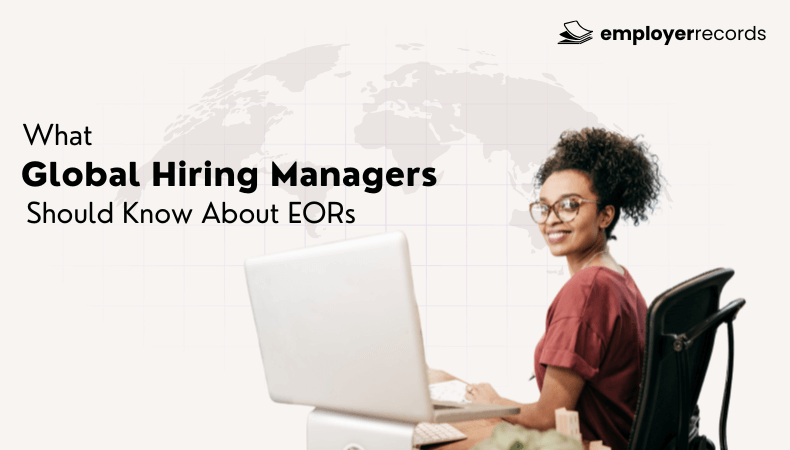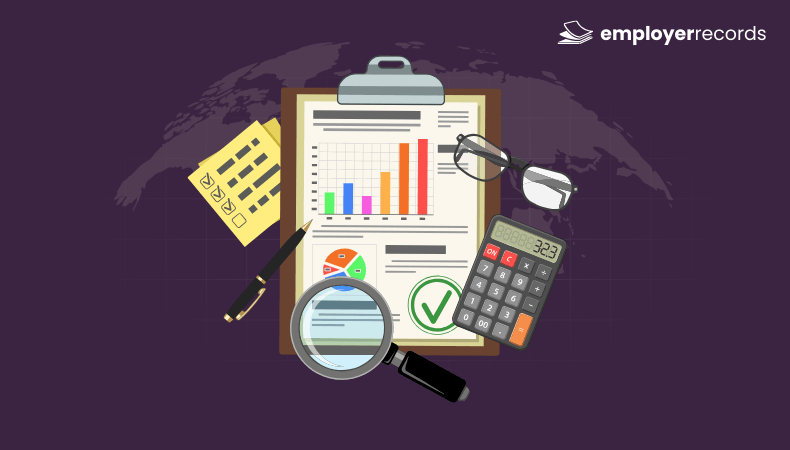As companies scale across borders, they rely on Employer of Record (EOR) platforms to manage compliance and payroll, but this also entrusts EORs with sensitive employee data.
This article explores what data EORs collect, the legal consequences of mishandling it, key regulations like GDPR/CCPA, and what businesses should look for in a secure EOR partner.
With the increasing stringency of data protection regulations like the General Data Protection Regulation (GDPR) and the California Consumer Privacy Act (CCPA), ensuring the security and privacy of employee records is paramount.
A breach or mishandling of such data can lead to severe legal repercussions and damage to a company’s reputation. Therefore, understanding how EOR platforms safeguard employee information is crucial for businesses aiming to maintain compliance and trust.
This article delves into the types of data EORs handle, the importance of data protection in global hiring, relevant compliance frameworks, and best practices for businesses.
What Data EOR Platforms Handle?
EOR platforms collect and process a broad spectrum of employee data, ranging from basic personal identifiers to detailed financial and immigration records.
Protecting this information is critical given stringent global privacy laws and the risk of regulatory penalties, reputational damage, or identity theft. Below, we break down each data category in detail and highlight key industry context on cross‑border data handling.
Personally Identifiable Information (PII)
EOR platforms routinely store direct identifiers, such as full names, home addresses, phone numbers, and email addresses, that can uniquely identify an individual and must be strictly protected to prevent unauthorized disclosure.
They also manage “linkable” PII—job titles, department names, employee IDs, that may not identify someone but when combined with other data points, could re‑identify them; safeguarding these quasi‑identifiers is equally important under privacy regulations like GDPR and CCPA.
Employment Data
Beyond basic PII, EOR platforms hold employment‑related records: signed contracts, offer letters, work schedules, and performance evaluations.
These documents often contain proprietary or sensitive company‑specific details that require secure access controls and versioning to ensure integrity and auditability.
Performance reviews and disciplinary records, in particular, are subject to additional confidentiality requirements, as mishandling can lead to legal disputes or claims of unfair treatment.
Financial Records
EOR providers process salary and benefits data, including payroll amounts, bonus structures, equity grants, and expense reimbursements—information that, if exposed, could facilitate fraud or social engineering attacks.
They also collect tax forms (e.g., W‑4, W‑8BEN) and banking details (account and routing numbers) needed for cross‑border payments; these financial PII elements must be encrypted both at rest and in transit under standards such as PCI DSS and SOC 2.
Immigration / Right‑to‑Work Documents
To verify eligibility, EOR platforms retain scanned passports, visas, work permits, and certificates of sponsorship, all of which include personal identifiers and biometric data.
These documents must comply with national laws, like the U.S. Immigration and Nationality Act or Australia’s Migration Regulations, which define how long records are kept, who can access them, and how they’re disposed of.
Industry Insight: According to the Atlas Global Employer of Record Report 2024, leading EOR platforms support hiring and payroll in 160+ jurisdictions, managing cross‑border employee data across multiple legal regimes and underscoring the need for robust transfer‑compliance mechanisms.
What Types of Data Do EOR Platforms Handle?
| Data Category | Examples | Why It Matters |
|---|---|---|
| PII (Personally Identifiable Info) | Full name, address, phone number, email, job title, employee ID | Must be protected under GDPR/CCPA; risk of identity theft and re-identification |
| Employment Data | Contracts, offer letters, schedules, performance reviews | Often confidential; mishandling can lead to legal disputes or unfair treatment |
| Financial Records | Payroll data, bonus structure, tax forms (W-4, W-8BEN), banking details | High fraud risk; must comply with PCI DSS and SOC 2 encryption standards |
| Immigration Documents | Passports, visas, work permits, biometric data | Regulated by national laws; crucial for right-to-work validation and auditability |
Why Data Protection Matters In Global Hiring?
As companies expand into new markets, they entrust third-party EOR platforms with vast volumes of sensitive personnel records, a responsibility that carries significant legal and ethical weight.
Ensuring robust data protection is vital not only for regulatory compliance but also for safeguarding corporate reputation, maintaining employee confidence, and preventing costly security incidents.
When employee data is compromised, it’s not just a tech failure, it’s a people problem. Employers must treat data privacy as a trust-building exercise, not just a checkbox.
Below, we explore the four primary consequences of mishandling employee data in a global hiring context:
Consequences of Mishandling Employee Data
Regulatory penalties (e.g., under GDPR or CCPA):
Under the EU’s General Data Protection Regulation (GDPR), organizations face fines of up to €20 million or 4 percent of global annual turnover for the most severe infringements, whichever is higher.
In California, the CCPA imposes civil penalties of up to $2,500 per unintentional violation and $7,500 per intentional violation, with no aggregate cap, exposing businesses to multi-million-dollar liabilities.
Damaged employer reputation:
Public disclosure of a data breach can irreparably harm brand image—65 percent of breach victims report diminished trust in the affected organization, and negative press can deter customers, partners, and investors alike.
Extended operational downtime following a breach further amplifies reputational losses, with some companies experiencing sharp declines in market valuation and consumer loyalty.
Loss of employee trust:
Beyond external stakeholders, internal morale suffers dramatically: a Ponemon Institute study found that 50 percent of employees lose confidence in their employer after a significant data compromise, leading to disengagement, productivity drops, and talent attrition.
Another survey revealed that over half of office workers would reconsider their employment if their data were exposed.
Security breaches and identity theft:
Exposed payroll and tax records are prime targets for identity thieves; victims of employee data breaches often face fraudulent tax filings, account takeover attempts, and financial fraud, resulting in both emotional distress and tangible financial losses.
Class-action settlements, such as the $1.2 million payout by TalentLaunch, underscore the high stakes of inadequate cybersecurity controls.
By prioritizing strong data governance policies and partnering with EOR providers that demonstrate certified security practices, organizations can mitigate these risks and foster a culture of trust and compliance.
Compliance Frameworks (GDPR, CCPA, etc.)
Compliance with international data protection regulations is a fundamental requirement for EOR platforms operating across borders.
Laws such as the General Data Protection Regulation (GDPR) in the European Union and the California Consumer Privacy Act (CCPA) in the United States establish stringent standards for the collection, processing, and storage of personal data.
These frameworks mandate that organizations implement robust data protection measures, including obtaining explicit consent, ensuring data minimization, and providing individuals with rights to access and delete their information.
Failure to adhere to these regulations can result in substantial penalties and damage to an organization’s reputation.
| Regulation | Region | Core Requirement |
| GDPR | EU/UK | Requires consent, data minimization, and access controls |
| CCPA | California, USA | Empowers employees to opt out and access their personal data |
| PIPEDA | Canada | Enforces accountability for data transfers |
| LGPD | Brazil | Governs personal data usage across borders |
Pro Tip: Verify that your EOR provider has Data Processing Agreements (DPAs) and documented internal audit processes.
How Do Leading EORs Protect Employee Data?
Leading Employer of Record (EOR) platforms prioritize data security to ensure compliance with international regulations and maintain client trust.
They implement comprehensive strategies that encompass both technological safeguards and procedural protocols to protect sensitive employee information.
These measures include encryption of data at rest and in transit, strict access controls, regular security audits, and adherence to data residency requirements.
By employing such robust security practices, EOR providers help organizations mitigate risks associated with global employment and data protection.
- Utilizes strong encryption algorithms to protect sensitive data during storage and transmission, ensuring confidentiality and integrity.
- Restricts system access based on user roles, ensuring individuals access only the information necessary for their responsibilities.
- Undergoes independent evaluations to verify adherence to established security standards, demonstrating commitment to data protection.
- Conducts simulated attacks and evaluations to identify vulnerabilities, enhancing the organization’s overall security posture.
Case Study: One leading EOR uses zero-trust architecture and geofenced data centers to isolate European employee records from U.S. systems, ensuring GDPR compliance.
Common Risks & Vulnerabilities
As organizations increasingly rely on employer-of-record (EOR) platforms to manage global workforces, ensuring robust data protection becomes paramount.
Despite implementing advanced security measures, EOR platforms are not immune to certain inherent risks and vulnerabilities that can compromise sensitive employee information.
Despite robust infrastructure, risks remain:
- Misconfigured Permissions: Improperly configured system permissions can grant unintended access to sensitive data, increasing the risk of internal data breaches.
- Vendor Dependencies: Reliance on third-party vendors can introduce vulnerabilities, as their security weaknesses may compromise your organization’s data integrity.
- Data Localization Conflicts: Conflicting international data localization laws can create compliance challenges, complicating cross-border data management and storage strategies.
- Human Error: Employee mistakes, such as misconfigurations or mishandling of data, remain the leading causes of security breaches in human resource systems.
Key Considerations For Businesses
When selecting an Employer of Record (EOR) platform, businesses should evaluate the following factors to ensure data protection and compliance:
- Data Residency and Storage: Ensure the EOR stores data within compliant jurisdictions, aligning with regional data protection laws.
- Consent Management: Verify that the EOR obtains and manages employee consent under legal requirements.
- Subject Access Requests (SARs): Confirm the EOR’s ability to process SARs promptly, respecting employee rights under data protection laws.
- Breach Response Plan: Assess the EOR’s incident response strategy, including notification procedures and mitigation measures.
- Security Audits and Updates: Ensure the EOR conducts regular security audits and implements timely updates to address vulnerabilities.
- Compliance Certifications: Look for EORs with recognized certifications (e.g., ISO 27001, SOC 2) demonstrating a commitment to data security.
- Access Controls: Evaluate the EOR’s implementation of role-based access controls to limit data exposure.
- Data Minimization Practices: Confirm that the EOR collects only necessary data, reducing the risk of unnecessary exposure.
- Third-Party Vendor Management: Investigate how the EOR manages third-party vendors to prevent indirect data breaches.
- Transparency and Communication: Ensure the EOR maintains open communication channels regarding data handling practices and policies.
- Employee Training Programs: Check if the EOR provides training to employees on data protection and privacy best practices.
- Scalability and Flexibility: Determine if the EOR can adapt to your organization’s growth and changing compliance needs.
By carefully considering these factors, businesses can select an EOR that aligns with their data protection requirements and supports their global expansion objectives.
Checklist: Ask for the EOR’s most recent security certifications, audit logs, and privacy impact assessments before onboarding.
Conclusion
In today’s globalized business environment, data protection within Employer of Record (EOR) platforms is not merely a backend concern, it is a critical frontline issue impacting compliance, credibility, and trust.
As organizations expand internationally, they entrust EORs with sensitive employee information, making robust data security measures essential. Non-compliance with data protection regulations like the General Data Protection Regulation (GDPR) can result in substantial fines and legal repercussions.
Moreover, data breaches can severely damage an organization’s reputation and erode employee trust. Therefore, selecting an EOR that prioritizes information security and adheres to global data laws is paramount.
Such EORs implement comprehensive data protection strategies, including encryption, access controls, and regular security audits, to safeguard employee data.
By partnering with EORs that demonstrate a strong commitment to data protection, companies can confidently scale their operations globally while upholding the privacy and security of their workforce.







